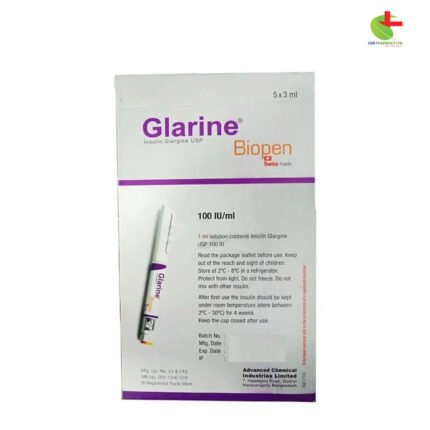Acilog 3ml
550.00৳ Cartridge(3ml)
- Protamine Crystallised Acilog is a rapid-acting insulin analog for improving blood sugar control in diabetes mellitus patients.
- Contains 100 IU of Insulin Aspart (rDNA) per ml, produced using recombinant DNA technology.
- Provides faster onset and shorter duration of action compared to regular insulin.
- Administered via subcutaneous or intravenous injection, as recommended by a healthcare provider.
- Helps regulate glucose metabolism, lowering blood glucose levels by facilitating cellular glucose uptake.
 Brand
Brand
|
ACI Limited |
|---|---|
 Generics
Generics
|
Insulin Aspart [Protamine Crystallised] |
 Type
Type
|
SC Injection |
Indications
Protamine Crystallised Acilog is a fast-acting insulin analog designed to assist in improving blood sugar control in patients with diabetes mellitus.
Always follow the advice of a registered healthcare provider when using this medication.
Composition
Each milliliter of the solution contains 100 IU (equivalent to 3.50 mg) of Insulin Aspart (rDNA).
Product Overview
Acilog (rDNA) is a sterile, clear insulin solution used for subcutaneous or intravenous injections. This rapid-acting insulin analog lowers blood glucose levels quickly and effectively. It works faster than regular human insulin and is produced through recombinant DNA technology, with a key difference being the substitution of proline with aspartic acid at position B28.
Pharmacology
Insulin Aspart primarily regulates glucose metabolism by binding to insulin receptors on muscle and fat cells. This process facilitates glucose absorption into cells and reduces glucose output from the liver, leading to lower blood glucose levels.
Dosage
Insulin Aspart has a faster onset and shorter duration of action compared to regular insulin. It should generally be injected immediately before meals. In some cases, it can be administered soon after eating.
The required dosage varies by individual and is determined by a healthcare provider, based on the patient’s needs. Typically, Insulin Aspart is used alongside long-acting insulin, which is administered at least once daily.
In adults and children over 2 years of age, the usual insulin requirement ranges from 0.5 to 1.0 IU/kg/day. For meal-related treatment, 50-70% of the insulin requirement may be met by Insulin Aspart, with the remainder provided by long-acting insulin.
Injection Method
- Subcutaneous Injection: Insulin Aspart should be injected into the abdominal region, thigh, upper arm, or buttocks. Inject within 5-10 minutes before meals.
- Continuous Subcutaneous Insulin Infusion (CSII): Insulin Aspart can be delivered via an insulin pump, with 50% of the total insulin dose given as meal-related boluses. The remaining dosage is infused as a basal dose.
- Intravenous Administration: For intravenous use, Insulin Aspart must be administered under medical supervision. It is important to monitor blood glucose and potassium levels to avoid complications such as hypoglycemia.
Administration Instructions
Before injecting Insulin Aspart, follow these steps:
- Insert the cartridge into the pen and attach the needle.
- Turn the pen gently for 8-10 times to mix the insulin.
- Remove the needle cap and expel air bubbles.
- Adjust the dosage and inject the insulin as prescribed.
- To avoid contamination, ensure the needle does not touch any surface.
Always follow the advice of a registered healthcare provider.
Drug Interactions
Certain medications can affect the effectiveness of Insulin Aspart:
- Decreased insulin requirements: Oral anti-diabetics, ACE inhibitors, disopyramide, fibrates, fluoxetine, and others.
- Increased insulin requirements: Thiazides, glucocorticoids, thyroid hormones, and more.
- Beta-blockers and alcohol can either enhance or reduce insulin’s blood glucose-lowering effects.
Side Effects
Possible side effects of Acilog include hypoglycemia, allergic reactions, injection site irritation, lipodystrophy, itching, and rash.
Pregnancy & Lactation
Acilog is classified as pregnancy category B. There are no restrictions on using Protamine Crystallised Insulin Aspart during breastfeeding. However, dose adjustments may be necessary.
Precautions & Warnings
Regular monitoring of blood glucose is crucial for all insulin users. Dosage adjustments should only be made under medical supervision.
Overdose Effects
While there is no specific overdose level for insulin, excessive doses can lead to hypoglycemia. Mild episodes can be treated with glucose or sugary products, while severe episodes require intramuscular or subcutaneous glucagon administration and intravenous glucose if necessary.
Therapeutic Class
Rapid-acting insulin
Storage Conditions
Store between 2°C and 8°C in a refrigerator. Do not freeze and protect from light.













Reviews
There are no reviews yet.